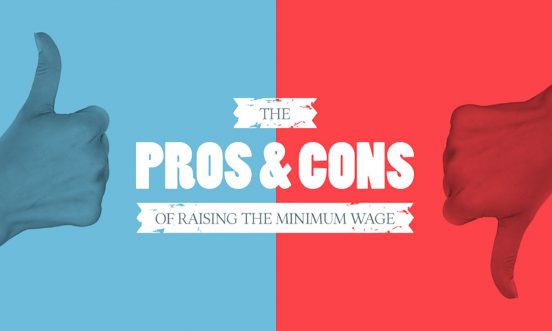For decades, the increase of the minimum wage has been a heated controversial topic for many workers and small business owners. Economists are mixed about whether or not the minimum wage should be raised to $15. To understand why, we must look at the issue from both an economical and humanitarian standpoint objectively.
Opponents of increasing minimum wages argue there is insufficient evidence to support that wage increases help decrease poverty rate. In fact, a study conducted by Michele Campolieti from the University of Toronto finds that minimum wages do not have a statistically significant effect on poverty. Rather, opponents to the increase believe that raising the minimum wage will simply force companies to raise their prices to compensate for the increased expenses. It would ultimately converge to a slightly higher cost of living and as a result, low-income families and individuals will have an even tougher time getting food for the dinner table.
Arguments in favour of a minimum wage rules on the idea that businesses have the moral responsibility to pay their employees a livable wage. Advocates for minimum wage hikes also push the notion that raises will stimulate the economy, arguing that more money to expend will mean more money would circulate throughout the economy. As such, they also believe there would be more opportunity for jobs. If minimum wage workers are spending more, then firms are also earning more and the demand for workers increase to keep up with increased sales. Moreover, the federal minimum wage had lagged behind with inflation, with raises every year and the minimum wage has only risen three times in the past three decades.
The decision is simply not easy since the consequences of either choice is hard to break down. Analyzing data from both sides of the matter can show you why. However, the factors are vary widely from province to province and as such, the issue should be looked at case-by-case. For an example, the livable wage in Ontario can be completely different than in Prince Edward Island. In fact, even at a provincial scale, the livable wage for a small town in Ontario contrasts the livable wage in Toronto. Each requires each province to take into account their own unique circumstances. Although raising the minimum wage is a complicated issue, it isn’t hard to understand why.
Word count: 388 words
Campolieti, M., Gunderson, M. & Lee, B. J Labor Res (2012) 33: 287. doi:10.1007/s12122-012-9139-8
By being targeted to low-income individuals or families through the tax system they are better targeted towards the working poor and child poverty, unlike minimum wages which are poorly targeted as discussed previously. (n.d.). Minimum Wages: Issues And Options For Ontario. Retrieved October 02, 2016, from http://www.fin.gov.on.ca/en/publications/2007/Gunderson/






Anonymous
November 1, 2016 — 12:09 pm
I think we should definitely increase the minimum wage for British Columbia and Ontario. To make life more affordable, so don’t have to move to out of town. Once we get out of post secondary.